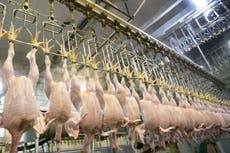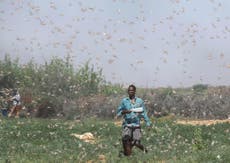The Independent's journalism is supported by our readers. When you purchase through links on our site, we may earn commission.
Unless we empower women farmers, we may not have enough to feed the planet
Our food systems cannot wait for women's equality – we must act fast to secure our sustenance
Our natural world is sending us increasingly more frequent and urgent signals that our food systems are in need of dire support.
Climate-related disasters seem to be appearing from every direction, from an emerging famine in South Sudan, locust swarms in east Africa, and hurricanes in the Philippines and the Caribbean, to name but a few.
The world’s farmers are coping with ever more unpredictable rainfall and growing conditions.
Rural women are disproportionately vulnerable, and they also play a critical role in reversing the problem and feeding a growing population. And yet they receive only a fraction of the focus they deserve.
Here’s how to enable them.
Ensure rural women can invest productively in their farms.
Compared to men, women grow 20 to 30 per cent less per hectare – not because they are worse farmers, but because they have fewer resources with which to work.
Women are often prevented from owning land. As a result, they are less able to secure credit to invest in their farms because they have no collateral. Without financing, they cannot easily buy higher quality seeds or fertilizer, recruit labour or sell what they produce at market as easily.
For instance, a study of 36 climate “hotspots” in India – which were vulnerable to drought, excess rainfall and heatwaves – showed women farmers most affected because they could not access climate-smart technologies and solutions as easily. Solutions like satellite-based insurance are helping overcome this divide if a disaster occurs, as they can be designed to be accessible equally to both men and women.
Ease the burden of daily household tasks typically done by women and girls.
Women and girls are often responsible for the daily collection of water and fuel for cooking. Climate-related water and food shortages disproportionately impact these groups as they must travel longer distances to find supplies.
New methods for turning household waste into fuels can help women tap into more reliable, cheaper and cleaner sources of energy – for instance a project in Uganda helping women turn banana waste into charcoal.
Women typically also grow and cook the food eaten by the family, including tending to the plots of staple crops, small kitchen gardens (for fruits and vegetables) and small livestock animals (for milk, meat and cheese). In Africa, up to 80 per cent of these basic foods are grown by women.
These household chores take time and are mostly unpaid, leaving women less opportunity to grow and sell foods at market. In Kazakhstan, a study of three villages along a waterway showed that, counterintuitively, the women most upstream, with the best access to water for their crops, actually earned the least. Why? Because they were furthest from the market, which was further downstream.
Moreover, these household tasks are often backbreaking, time-consuming, and repetitive – for instance, weeding entire fields by hand, stooped over at the waist. Or they can even be outright unsafe, with indoor pollution from cooking responsible for an estimated 600,000 deaths in Africa every year – a third more than total malaria deaths, globally.
This also means women tend to have less time to attend field demonstrations, access market information or otherwise strengthen food systems.
Build research systems and cultures to be more gender equitable in the long run.
Breaking out of this downward spiral requires a rethink on how rural women are reflected and participate in society at large.
Bridging the gender productivity gap in agriculture could feed an additional 150 million people – all while keeping existing forests, pastures and other habitats and natural carbon sinks intact. While it is not women’s responsibility alone to tackle this challenge, they should also benefit from the increased production from doing so.
When women groundnut farmers in Nigeria banded together to pool resources, they got access to land, credit and improved seeds, virtually doubling their yield in the process. They sell extra at market to make profits, which then get re-invested. An upward spiral, no doubt to be celebrated. However, it would be even more effective if the system itself could be changed so that they could accomplish this on their own should they have wished to do so.
Achieving greater gender equality will help to strengthen the resilience of our food systems, revitalize rural economies and enhance rural livelihoods.
It has been 25 years since Hillary Clinton famously declared, “Human rights are women’s rights and women’s rights are human rights.” Yet women’s economic parity is estimated to take a further 257 years to achieve. Our food systems simply do not have that long to wait.
Dr Claudia Sadoff is director general of the International Water Management Institute, and gender champion for the Consultative Group for International Agricultural Research (CGIAR).





Join our commenting forum
Join thought-provoking conversations, follow other Independent readers and see their replies